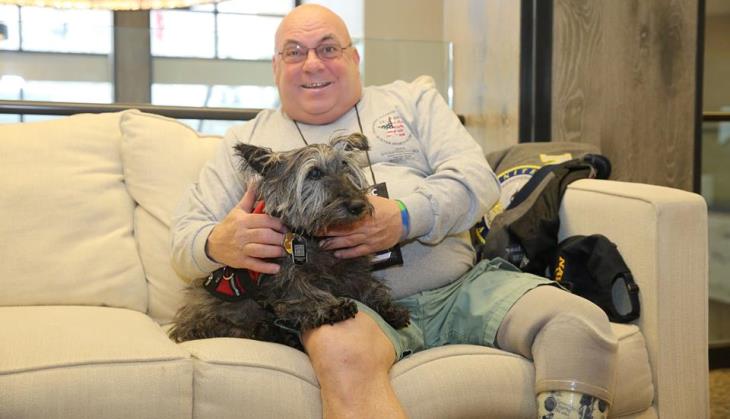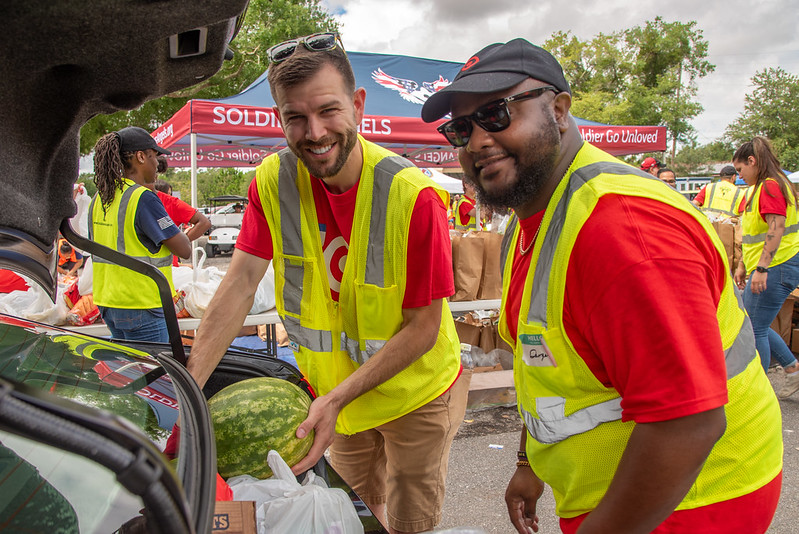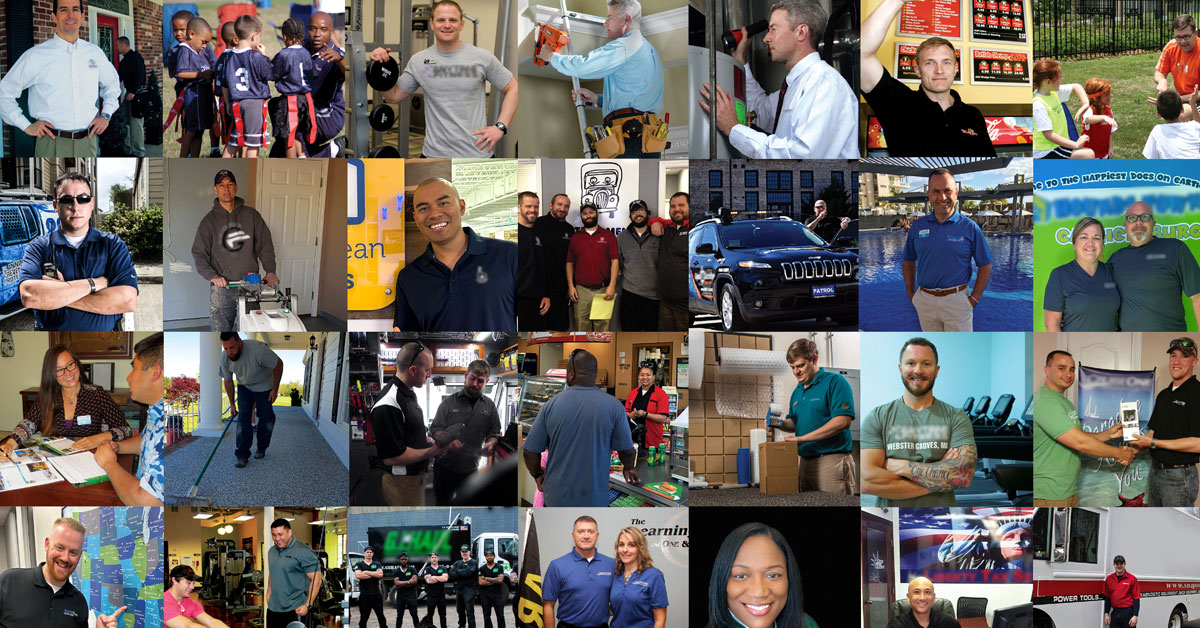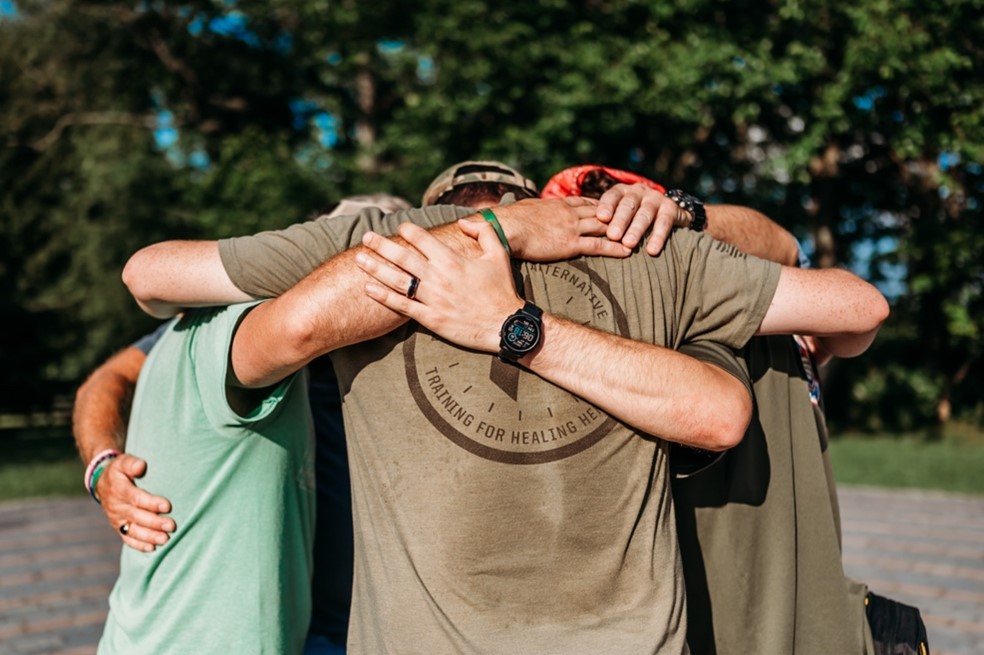Robert “Bob” Haas, a retired U.S. Navy supply officer and Vietnam Veteran, was screaming in agony while attending the Summer Sports Clinic in San Diego, California, when he was approached by a professionally dressed man he did not recognize.
The man asked him why he was yelling. After a 45-minute conversation, the man left Haas his card and let him know that he was going to take care of him.
That man was VA’s then-Under Secretary for Health, Dr. David Shulkin. Shulkin, who is now secretary, personally helped Haas get his life back.
Haas lost his left leg above the knee due to blood clots and four years after surgery, it continued to cause extreme pain. “He diagnosed me right then and there with neuroma. He emailed me and got me in touch with the right people to help fix me,” Haas said.
Two months later, Haas underwent surgery at the Columbus VA Ambulatory Care Center to correct the neuroma in his stump.
“[Dr. Shulkin] focused on treatment and results. He restored my life,” he said. “I think David Shulkin would help any Veteran in pain. He would stop and make sure they’re taken care of. He is a doctor and right kind of leader for VA.”

Navy Veteran Bob Haas takes to the slopes of Snowmass at the 2017 National Disabled Veterans Winter Sports Clinic.
Haas is now able to enjoy the events hosted by VA such as the Summer Sports Clinic. He participates as often as possible. This week, at the Winter Sports Clinic, he credited meeting Teresa Parks for his interest in winter sports.
“I met Teresa and she was so welcoming and warm. The [Winter Sports] Clinic truly is a miracle on the mountainside.”
Restoring his life and getting active again are the main priorities in Hass’ life these days. He wants other Veterans to use the adaptive sports programs offered by VA, so they can heal like he has.
“The [Winter Sports] Clinic is a safe environment for Veterans to get off the couch and onto the playing field. It is about wellness, not just sports. There are no medals for fastest racer, there are awards for most improved, but you have to get off the couch first,” Hass said.
The National Disabled Veterans Winter Sports Clinic made such an impact on his life that Haas created an adaptive sports program at home. With help from the Columbus VAMC, disabled Veterans receiving care from the VA can enjoy a variety of adaptive sports including sled hockey, yoga, swimming and rowing among others – for free. Haas feels strongly that Veterans need an outlet to get active and the VA is the right place to start.
In his not-so-spare time, Bob volunteers as a peer counselor at the Columbus VA and Amputee Coalition. He sits on the Delta Airlines Disabilities Board of Directors, as well, helping advocate for travelers with amputations.
His role in this vast amount of organizations led to a countless number of friends, especially at the Winter Sports Clinic.
“When you come to a VA event, you meet other people from the VA who the VA has helped adapt to their injury,” Haas said.
Friendships are built through participation and the friendships you make here last forever.
These days, Haas and his service dog Gracie come back to the Winter Sports Clinic every year. He meets up with old friends and skies freely down the Rocky Mountains.
“Before my amputation, I used to run marathons. Now, I am just as active,” he explained. “I consider myself a walking success of these events.”
About the author: Eve Neisen is a public affairs specialist with VA’s Office of Public Affairs.
Topics in this story
More Stories
Soldiers' Angels volunteers provide compassion and dedication to service members, Veterans, caregivers and survivors.
Veterans are nearly three times more likely to own a franchise compared to non-Veterans.
Built by Veterans for Veterans, Warrior PATHH is an in-person program designed to train you to manage struggle, trauma and hardship.







When I read this article, just minutes ago, I was so inspired to the point where I said to myself, I’m ready to go back to the VA Hospital (Miami VA Medical Center, which I stopped going well over a year ago because they were not providing their best interest of health care services in my opinion. Having gone through five surgeries on my lower back, and the many other conditions, including one of great concern; the cervical, which I have not received any care of the condition that it’s in, I am really looking forward to this Dr’s services he’d provide to the gentleman, Mr Haas, as was commented on this article. I’m hoping that I can receive the same treatment, where I can get my life back together.
This a great story with a happy ending, but how long did Bob suffer before a doctor (Dr. Shulkin) came along? Is Dr. Shulkin the only one out of thousands of other doctors that get it? He seems to be, and that is the real problem with the VA. There are lots of doctors, but very very few that would make it in civilian medical practice. Makes me feel that they should be kept at the VA and not turned loose on the general public. Some students are straight “A” students and some pass with ” C average and below” and those go on to work at the VA. They seem to be C average and below in college, and that is the only caliber of Doctor I ever got while in the Army. The ones that didn’t “get it”, and as a result, 20+ vets everyday take their own lives as a result. There is no standard to live up to, no level of competence needed, no accountability or responsibility level for medical staff to be held to, so they retain the “A” average attorneys to defend the incompetent medical staff. Why is that? Why could only 1(one) Doctor help Bob? How many years did he suffer before meeting Dr Shulkin? Acupuncture was probably the only treatment he received before Dr Shulkin came along. Acupuncture is the VA’s new cure all because it’s cheap. It does nothing, but it is cheap, and the new sugar pill, but cheaper. The VA is caught up in the “cheap” factor because it will not do the right thing, the first time, and will not learn from mistakes. It has the “C average disease”, and refuses to take treatment for it. It refused to help thousands of us, and still does, with the “rocks for brains” leaders in control. Maybe with haveling a real doctor we can start the healing process and help instead of refusing “help”.